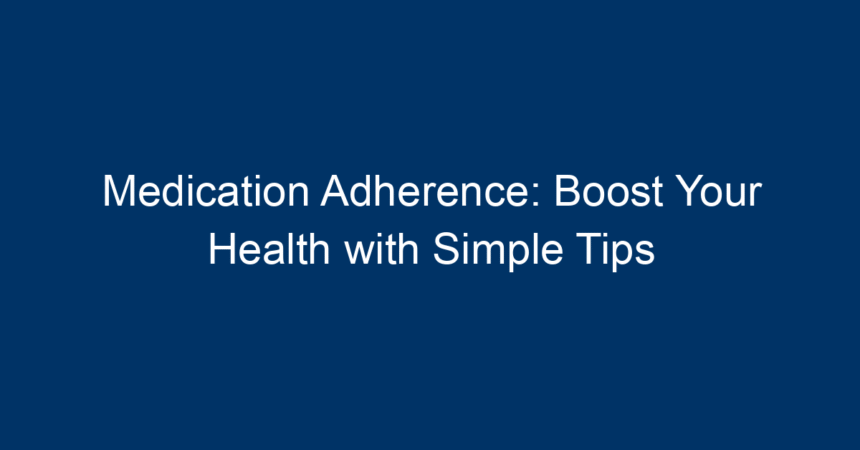Introduction
In today’s fast-paced world, maintaining your health can often feel like a daunting task, especially when it comes to medication adherence. Millions of people struggle to take their medications as prescribed, leading to negative health outcomes and increased healthcare costs. But aligning your habits with your healthcare needs doesn’t need to be complicated. By implementing a few simple strategies, you can enhance your medication adherence and significantly improve your overall well-being. This article delves into practical tips and methods that can help you stay on track with your prescriptions while fostering a healthier lifestyle.
Understanding Medication Adherence
Before diving into effective strategies, let’s clarify what medication adherence means. It refers to the extent to which patients take their medications as prescribed by their healthcare providers. Poor adherence can stem from various factors, including forgetfulness, complex medication regimens, and side effects. Understanding the importance of sticking to your medication schedule is the first step towards boosting your health.
Why Medication Adherence Matters
- Prevention of Complications: Consistently taking your prescribed medications can help prevent complications from chronic conditions such as diabetes, hypertension, and heart disease.
- Cost-Effectiveness: Improved medication adherence can lead to fewer hospital visits and lower healthcare costs.
- Enhanced Quality of Life: Staying committed to your treatment plan can lead to noticeable improvements in your day-to-day life, allowing you to engage more fully in activities you love.
Simple Tips to Improve Medication Adherence
1. Use Pill Organizers
One effective way to enhance medication adherence is to use a pill organizer. These devices come in various forms and can help you keep track of your daily medications. By sorting your pills weekly or monthly, you can easily see what needs to be taken and when, reducing the risk of missed doses.
2. Set Reminders
In our tech-savvy era, smartphones can serve as powerful tools for ensuring medication adherence. Set alarms or use dedicated reminder apps to prompt you when it’s time to take your medication. Some people find that visual cues—such as sticky notes on the fridge or bathroom mirror—are also helpful.
3. Establish a Routine
Creating a daily routine can significantly enhance your medication adherence. Try to take your medications at the same time every day, ideally when you are already engaged in a habitual activity (e.g., brushing your teeth, having breakfast). This association can make it easier to remember.
4. Educate Yourself
Understanding your medications, including their purpose and potential side effects, can deepen your commitment to adhering to your regimen. Discuss your prescriptions with your healthcare provider to clarify any doubts. Knowing how each medication benefits your health can motivate you to take them consistently.
The Role of Healthcare Providers
1. Open Communication
It’s crucial to maintain open communication with your healthcare provider. If you experience side effects or have difficulty remembering to take medications, talk to your doctor. They may adjust dosages or offer alternatives to better suit your lifestyle.
2. Regular Follow-Ups
Scheduling regular check-ups ensures you stay on track with your medications. These appointments provide opportunities for healthcare providers to monitor your progress and make necessary adjustments to your treatment plan.
Combining Support Systems
1. Involve Family and Friends
Having a support system can play a vital role in enhancing your medication adherence. Inform family members or friends about your medications so they can help remind you when you need it. Their encouragement can make a world of difference in keeping you accountable.
2. Join Support Groups
Consider joining a support group for individuals with similar health conditions. These groups offer a sense of community and resources that can motivate you to stay committed to your treatment plan. Sharing strategies and experiences can provide valuable insights into improving medication adherence.
Understanding the Challenges
1. Side Effects
Medication side effects can deter patients from adhering to their treatment plans. If you’re experiencing side effects, don’t hesitate to discuss them with your healthcare provider. They may recommend strategies to mitigate these effects or adjust your treatment.
2. Complexity of Regimen
Many patients face challenges with complex medication regimens, such as those involving multiple medications taken at different times. For these individuals, simplifying their regimen, either by using combination pills or through medication synchronization (consolidating multiple prescriptions into fewer refills) can improve adherence.
Tracking Your Progress
1. Keep a Journal
Maintaining a medication journal allows you to track your dosage and note any side effects or changes in your health. Writing down your experiences can help you recognize patterns that impact your medication adherence, allowing for adjustments to improve your routine.
2. Use Medication Tracking Apps
There are various mobile applications specifically designed to assist with medication adherence. These apps can provide reminders, track your medication usage, and even alert you when it’s time for refills. They often include features that allow you to share your progress with healthcare providers.
The Importance of Patient Empowerment
1. Taking Charge of Your Health
Being proactive about your health is vital for improving medication adherence. Educate yourself about your condition and treatments, and take an active role in discussions with your healthcare providers. Feeling empowered in your health journey can enhance your commitment to following your medication regimen.
2. Celebrate Small Wins
Celebrate your milestones—whether it’s consistently taking your medication for a week or successfully reducing side effects. Recognizing your efforts helps reinforce positive habits and motivates you to stay committed to your health goals.
Conclusion
Medication adherence is critical for effective health management. By employing simple strategies—such as using reminders, establishing routines, and involving a support system—you can optimize your medication-taking habits. Always communicate openly with your healthcare provider, track your progress, and educate yourself about your medications.
Remember, improving medication adherence doesn’t need to be a struggle. With these actionable tips at your disposal, you can take charge of your health, reduce potential complications, and lead a fuller, more vibrant life. Start today, and you’ll be amazed at the difference it makes! Your health journey awaits!




